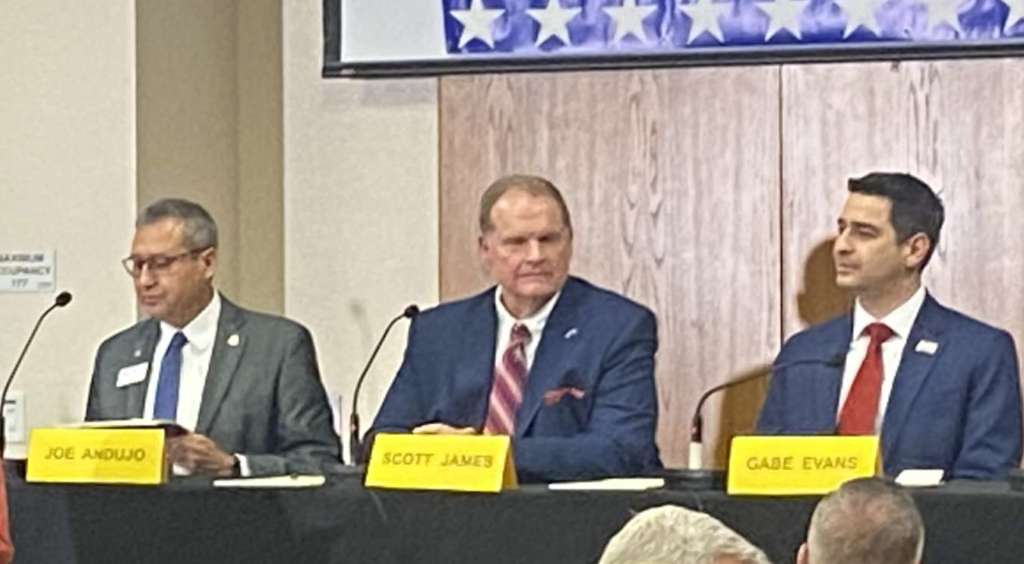At least eight Republican congressional candidates in Colorado support the 2022 overturn of Roe v. Wade but are saying they would oppose legislation in Congress to establish a national abortion ban.
The states should be in charge of creating abortion laws, they say, not the federal government.
But seven of these GOP candidates have yet to specify the abortion laws they want Colorado or other states to enact, obfuscating their positions on abortion bans or restrictions.
The U.S. Supreme Court’s 2022 Dobbs decision, overturning Roe v. Wade’s protection of abortion rights nationally, gave states the right to pass their own abortion restrictions, and 14 states, including Oklahoma, Texas, and South Dakota, have enacted total bans, according to the Guttmacher Institute, an abortion rights group. An additional 28 states prohibit abortion at some point during pregnancy.

Just this week, state Rep. Scott Bottoms (R-Colorado Springs), a hard-right conservative, introduced a total abortion ban that has no exceptions, even for pregnancies resulting from rape. Bottoms’ bill is the latest in a long string of efforts by conservatives in Colorado to restrict abortion, both in the Legislature and via ballot initiatives.
It’s not known whether all Colorado congressional candidates who oppose both Roe and a national abortion ban would support Bottoms’ bill or other state legislation.
State Rep. Mike Lynch (R-Wellington), a Colorado congressional candidate who opposes a national abortion ban and wants states to decide abortion policies, is a co-sponsor of Bottoms’ bill.
State Rep. Richard Holtorf (R-Akron) didn’t return an email seeking to know his stance on the bill.
The silence of Holtorf — and that of candidates with similar stances — has the effect of concealing or at least muddling their views on abortion policy, say critics, allowing the candidates to appear to be both anti-abortion (supporting the overturn of Roe) and pro-choice (opposing a national abortion ban and favoring choice for states), in a year when the issue will likely play a critical role in elections across the country.
“Even in Colorado, Republicans have repeatedly introduced extreme abortion bans, ignoring the will of Colorado voters,” said Laura Chapin, a spokeswoman for COBALT, which aims to protect the public’s access to reproductive health care.
“The whole point of Roe is that rights are rights; they’re not subject to politics or politicians,” said Chapin. “Leaving the decision to the states means leaving it to politicians who want to ban abortion.”
The eight anti-Roe Republican congressional candidates in Colorado who oppose a national ban include five in the race to represent Colorado’s 4th Congressional District, which is located in eastern Colorado: state Representatives Holtorf and Lynch, Weld County Council member Trent Leisy, former congressional staffer Chris Phelan, and businessman Peter Yu.

In Colorado’s 8th Congressional District, which spans an area mostly north of Denver, three candidates oppose Roe and want states to create their own abortion laws: state Evans, Weld County Commissioner Scott James, and Air Force veteran Joe Andujo.
Grand Junction attorney Jeff Hurd, who is running in Colorado’s 3rd Congressional District in southwestern Colorado, has said that abortion policy is “primarily a state issue.” This stance leaves the door open for supporting a national ban of some kind.
New Law Could Undermine Colorado Law Protecting Abortion Rights
Colorado’s Reproductive Health Equity Act (RHEA), passed by Democrats in 2022, protects abortion rights in the state, but RHEA could be superseded, and abortion restrictions could be enacted in Colorado, if an anti-abortion bill clears the Legislature and is signed by the governor, according to Mar Galvez Seminario, legislative and research manager for Colorado Organization for Latina and Reproductive Rights (COLOR), which advocates for Latinx people. This would include RHEA and the state’s path-breaking 1967 law legalizing abortion throughout pregnancy.
Bottoms’ bill states: “The bill declares that any existing state law relating to prenatal neglect, homicide, or assault, or regulating abortion or abortion facilities, is superseded to the extent it conflicts with or is inconsistent with the bill … The bill authorizes the state to disregard any federal court decision that purports to enjoin or void the bill and subjects a Colorado judge to impeachment or removal if the judge purports to enjoin, stay, overrule, or void the requirement.”
“If Bottoms’ bill passed somehow, it would take RHEA off the books because it went through the Legislature. The only way to guarantee the right to abortion in Colorado is to enshrine it in the state’s constitution,” said Galvez Seminario.
Chapin agrees, telling the Colorado Times Recorder via email that Bottoms’ bill “doesn’t have the votes to get out of committee, much less pass the legislature, but it’s yet another reason why ‘rolling abortion rights back to the states’ is a lie.”
Coloradans for Protecting Reproductive Freedom, which includes COLOR and Cobalt, is collecting signatures to put Proposition 89 on the November ballot. It would add the right to abortion to the Colorado constitution.
“It’s more important than ever now to have something solid in Colorado,” said Galvez Seminario.
CORRECTION: This article was updated to state that Lynch is a cosponsor of Bottoms’ bill.




